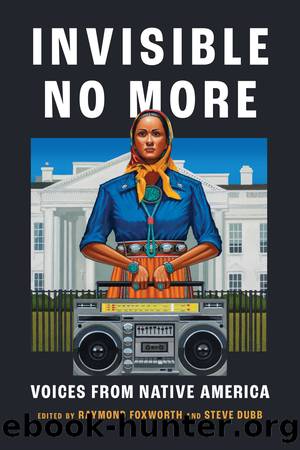Invisible No More by Unknown

Author:Unknown
Language: eng
Format: epub
ISBN: 9781642833126
Publisher: Island Press
Figure 11-2. Faith Comardelle holds a timeline aloft at an Isle de Jean Charles resettlement planning meeting, 2018. Photo by Chantel Comardelle.
But that hope of breathing spirit into our tribe has now dwindled due to the state of Louisianaâs slow response and improper execution of the HUD grant. In the last significant amendment,16 the state made it clear that the IDJC Tribe was no longer a beneficiary of nor involved in the grant process.17
The grant did not turn out to be the catalyst for re-creating the self-sustaining society we once loved, but we remain committed to our vision. The tribe has invested in âPreserving Our Place,â a movement to preserve the island and the IDJC Tribeâs long legacy of traditions, culture, and history.18 In November 2019, the IDJC Tribal Council approved the first Tribal Museum Policy that established our own tribal museum and culture center, the first step to realizing our goals, and has many moving parts. Community gardens, storytelling activities, craft demonstrations, and historical exhibits are just the tip of the iceberg.
The effort to ensure that the island does not erodeâand our culture and traditions along with itâis the most important piece of this puzzle. For a displaced, impoverished, and marginalized community, the physical and financial means to undertake such a task are minimal.
Thinking of the vastness of the undertaking, I look (ironically) for guidance in the Declaration of Independence and the US Constitution, whose preamble begins, âWe the People.â To fully accomplish our goal, we, the people of the tribe, the community, and the country must ensure that the communities facing climate migration and resettlement are fully resourced. Communities dealing with these grave climate conditions need everyone to rally behind their vision to ensure the preservation of their place and join them in solidarity.
The solidarity should include everyone, from the federal government to philanthropy. The Government Accountability Office issued a report in July 2020 stating, âWe recommended Congress consider establishing a federally led pilot program to help communities interested in relocation.â19 The report, which accurately covers the IDJC Tribeâs resettlement process, clearly states that there are many complex problems with the current resettlement plan. Additionally, two key points were noted regarding cultural dimensions in a recent journal article examining relocation outcomes. The first point is that, compared to other areas of livelihood, there are limited studies focusing on the cultural implications of resettlement, with over 50 percent of studies not discussing any cultural outcomes at all. The second point is that, of the cases that did discuss culture, culture was impacted greatly through the process of resettlement, with almost 90 percent of cases reporting negative outcomes.20 The truth is that many resettlement planners never address the cultural aspect of relocation.
So how do we help work alongside communities like the Isle de Jean Charles Tribe? Developing a community-oriented framework for relocating entire communities is a first step. Frontline communities are bearing the brunt of climate change and are the experts in this process. The policy makers and leaders need
Download
This site does not store any files on its server. We only index and link to content provided by other sites. Please contact the content providers to delete copyright contents if any and email us, we'll remove relevant links or contents immediately.
The Secret History by Donna Tartt(16675)
The Social Justice Warrior Handbook by Lisa De Pasquale(11495)
Thirteen Reasons Why by Jay Asher(7806)
This Is How You Lose Her by Junot Diaz(5802)
Weapons of Math Destruction by Cathy O'Neil(5053)
Zero to One by Peter Thiel(4840)
The Myth of the Strong Leader by Archie Brown(4796)
Promise Me, Dad by Joe Biden(4459)
Beartown by Fredrik Backman(4438)
Stone's Rules by Roger Stone(4426)
How Democracies Die by Steven Levitsky & Daniel Ziblatt(4424)
The Fire Next Time by James Baldwin(4354)
100 Deadly Skills by Clint Emerson(4089)
A Higher Loyalty: Truth, Lies, and Leadership by James Comey(4044)
Rise and Kill First by Ronen Bergman(4026)
The David Icke Guide to the Global Conspiracy (and how to end it) by David Icke(3899)
The Farm by Tom Rob Smith(3882)
Secrecy World by Jake Bernstein(3792)
The Doomsday Machine by Daniel Ellsberg(3742)
